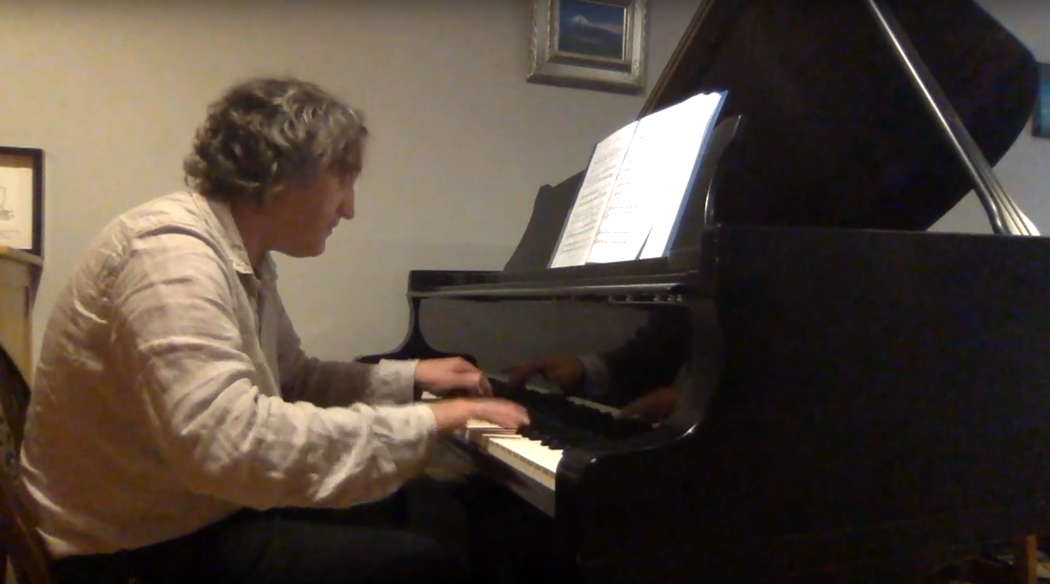 WORD SEARCH: Can you solve Allan Rae's classical music word search puzzles? We're currently publishing one per month.
WORD SEARCH: Can you solve Allan Rae's classical music word search puzzles? We're currently publishing one per month.
Unlocking Creative Potential
MALCOLM MILLER listens to
'Lockdown Suite' by Malcolm Singer
A stunning world premiere of Lockdown Suite for solo piano by British composer Malcolm Singer, superbly played by Anthony Hewitt, formed the highlight of an online concert devoted to Singer's music on 22 June 2020, presented by the Orpheus Sinfonia, an orchestra for young professional musicians. The online concert formed the twenty-fourth concert of the imaginative series Adjourned but Still in Session. This is one of the innovative ideas characteristic of the orchestra's approach, tackling the hurdles of the COVID-19 period with thirty-minute programmes of all kinds, 'live-streamed' on YouTube by the orchestra's freelance musicians.
More than just a concert, the performances on this occasion were interlaced with a Zoom interview with Malcolm Singer conducted by the Orpheus Sinfonia's Artistic Director Thomas Carroll, who elicited fascinating anecdotes about Singer's education in Britain and the USA and encounters with influential mentors and colleagues such as Ligeti, Nadia Boulanger and Yehudi Menuhin, amongst others.
Singer recalled how in the mid-1970s he had brought his newly composed flute solo piece Mittim (1974) to the then-blind Boulanger who displayed her uncanny aural abilities in noticing tiny details. Played here evocatively by Pasha Mansurov, it came across as an engaging work displaying a refreshing atonality, melodic invention, and rhythmic variety and momentum. Singer spoke about his time as Director of the Yehudi Menuhin School for some nineteen years, where Thomas Carroll had been his pupil, later colleague. Singer's moving Elegy for solo violin (1999) composed for Menuhin's funeral held at the Menuhin School, recalled as a 'chaotic and sad time', was eloquently played here by Boris Kucharsky. Bell-like left hand pizzicato formed a sonorous pedal point over which Kucharsky projected the soulful polyphony to its intense climax, where a fresh and vibrant lyrical theme emerges to the foreground, a quotation from Bloch's Avodah, composed for Menuhin in his youth.

Malcolm Singer
Singer's Lockdown Suite for solo piano (2020) was inspired by a project of Singer's former student, the composer-pianist Prach Boondiskulchok, who set himself a challenge of a two-part invention every day. Singer responded with a project of his own, writing short piano pieces, each in a day, during the recent weeks of 'lockdown'. Singer explained his delight at returning to the piano and his predilection for composing miniatures, some as short as thirty seconds, the longer ones at around two minutes. The result was the Lockdown Suite, and Anthony Hewitt's masterly premiere here brought to life the many contrasts of mood and colour in this varied collection.

Anthony Hewitt playing Malcolm Singer's 'Lockdown Suite'
Singer's exploitation of the full span of the piano keyboard for colouristic purposes, in a manner reminiscent of Kurtág's Játékok or Andre Hajdu's Milky Way collections, was striking. The arresting introductory gesture at the very top of the range in the first piece, 'In the abyss', is followed by a swift descent to the very lowest part of the keyboard, in complex trilling patterns. That same high low contrast formed a witty element in the final work, 'Baby Talk', a glistening witty textural essay 'as if played by a baby', dedicated to the composer's grandson Reuben, celebrating his first birthday during lockdown. The second piece, 'Homage to my teacher', explored Ligeti-like clusters again registrally coloured with rocking patterns in the very highest range countered by a sustained harmonic strand in the bass. A stark contrast ensues with a more expansive 'Alarm bells', in which a sense of space is generated through widening intervals centred on a tritonal relationship, followed by the pithy, jazzily canonic 'Helter-skelter'.
The expressive heart of the set is featured in the fifth and sixth pieces, the first, 'Cortege - in Memoriam', exploring dark low colours, played with dark emphasis, eventually released into the ostinatos in the upper register. Its mood summed up the frustration and even grief of the COVID-19 period. It is balanced by the ethereal delicate sonorities 'For Zamira', a piece composed a year earlier as an eightieth birthday greeting to Menuhin's daughter, a pattern of ever widening intervals filling the keyboard span from its centre. More explorations of the piano's sonorities ensue in the sustained colours of 'Sympathetic Resonances' in which bass notes held down throughout give rise to high overtones, which came across with remarkable immediacy even through the online medium, fully justifying the Orpheus Sinfonia's endeavour to disseminate artistic ideas to the public in what has been an unprecedented period of self-isolation whilst, with the chance for the online audience to offer donations, as they write on their website, 'ensuring freelance musicians are supported'. Truly Malcolm Singer's 'Lockdown' Suite represents an admirably unique unlocking of creative potential and possibility.
Copyright © 24 June 2020
Malcolm Miller,
London UK

FURTHER INFORMATION: MALCOLM SINGER
FURTHER INFORMATION: ORPHEUS SINFONIA



